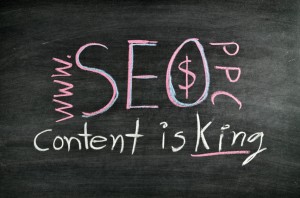When it comes to Search Engine Optimization, there are some great techniques used to help clients reach the top of search engine results pages. One of these techniques, link building, has become heavily scrutinized by Google and as a result, it’s our duty to reevaluate the benefits and consequences of how we view this process. We tend to hear SEO’s say “But the links we’ve built are high-quality links”. But what does the term “high-quality” mean to the person who built it, compared to what Google wants from us? Google has given us every reason to believe that link building should not be a “process” but an inevitable result of our other high-quality SEO efforts. Let’s take some time to review why.
1. Don’t make link building a goal or process
The goal of our clients is to increase their profits. Increased profitability will come as a natural result of qualified traffic, which will most likely come from higher positions in search engine rankings. Links from high authority domains are one of the most significant reasons a website will rank highly in Google and other search engines. So if links equal rankings and rankings equal traffic, why would we want to eliminate “Link Building” from our goals?
Link building is a process that often refers to poor tactics used to obtain as many links as possible. These techniques usually include buying links and link spamming. Websites that are willing to accept payment for links are most likely not the type of site you want linking to your client’s site. These low quality links won’t do much to aid in your SEO efforts and will most likely ending up hindering your ability to gain ground in search engine rankings. If we continue to pursue links through this route, your client will most likely end up being penalized by Penguin and could potentially by banned by Google.
As an industry, we have become so enveloped with link acquisition, that we often forget what we should be doing prior to obtaining them. We spend our time measuring the number of links we have, we often forget what the real goal is. Being profitable is the goal and quality content, guest posting, events and providing value are the methods we should be focusing on to reach our goal. As marketers, if we’re able to reach this goal by increasing organic traffic and referral traffic, then we’re doing the right thing.
2. Google doesn’t want link building to be part of our process
We hear a lot about “White Hat” and “Black Hat” SEO techniques. These descriptions are more based on practices rather than whether or not someone is good at marketing or not. Truth is, if buying links was a sure-fire way to increase rankings, we would all do it. The effectiveness of the techniques we use are governed by Google, whether we like it or not. Since we have to adhere to Google’s standards to be successful, buying links and spamming are simply unsustainable marketing practices.
“The philosophy that we’ve always had is if you make something that’s compelling then it would be much easier to get people to write about it and to link to it. And so a lot of people approach it from a direction that’s backwards. They try to get the links first and then they want to be grandfathered in or think they will be a successful website as a result.”
-Matt Cutts in an interview with Eric Enge
So as Matt states, link building isn’t a terrible thing, but we have to understand the right way to do it. When we look at the process of link building as an activity, as opposed to the outcome of our efforts, we’re doing it wrong.
If we tried to fight against Google’s standards, we’d lose. So it stands to reason that we should be focused on what Google wants from us. With the release of Penguin, Google’s latest algorithm, Google now penalizes for poor link building practices. Creating artificial links through link buying and spamming is one thing Google is trying to fight against.
3. Google doesn’t count links the way it used to
We can’t be sure of what Google will do in the future, so it stands to reason that we should focus on what Google is already doing. Why did Google begin counting links in the first place? What was the intention? Google’s algorithm is extensive and it understands a multitude of things. It understand anchor text, links, how words relate to each other and what you website relates to. But the algorithm also understand things like social shares and brand mentions.
We need to consider the degree to which other factors are used by Google. Great content, useful information, popularity, products and great websites all attract popularity signals. Facebook likes, Twitter shares, Google +1s all translate into popularity signals and help drive traffic to your site. We can’t be sure of the extent to which Google uses these for ranking, but we can be sure that they do relate to Google’s perceived value of a website. Why have we become so focused on the single goal of link building, when there are so many other factors Google uses to value websites?
4. We all define a “good link” differently
A “good link” to one person may be completely different to another person, or even Google. The idea of obtaining links isn’t inherently bad, but when we discuss the ability to obtain links that are worthwhile, we end up realizing that the focus needs to be on marketing to our audience.
I’ve seen many debates over what’s considered a “good link” and what’s not. The truth is, we all have a differing opinion on the matter. In my opinion, a good link should provide the user with a way to reach what they’re looking for. If a link does that, then it’s probably a good link. A paid link that sits on a website and isn’t used, provides very little value to anyone.
If our efforts were spent on obtaining visibility for our clients, the links would surely follow. We need to help our clients focus on the real goals, rather than the goal of link building. Although links can help rankings, we need to utilize them as measuring benchmarks to track the results of our goal of website traffic.
5. Focusing on links prevents you from seeing other opportunities
As SEO professionals, we have the ability to learn what organizations are doing to help their SEO campaigns. One organization I’m aware of has a monthly budget of $15,000 for obtaining links through buying and renting them. At the time, they hadn’t been penalized by Google and their rankings were doing well. The problem is, they weren’t experience any improvements in the SEO campaign.
They were focused on buying as many links as possible, partially because they saw that their competition was doing the same thing. Rather than risk letting their competition own more links, they continued to throw money at this tactic. But was this really an effective way to spend all of that money?
How else could they have spent that much money to bring better awareness of their company? There are actually quite a few ways that money may have benefited them more. Content creation, contests, building a better business or a better website could all bring better returns than buying links. The truth is, the links they purchased will most likely be penalized by Google; if not now, in the future. Which means not only was that money wasted, it may end up severely hurting their business.
6. Online marketers need to differentiate themselves from link spammers
Putting an emphasis on link building will most likely result in a terrible outcome for our industry as a whole. New marketers coming into the business hear about link building from everyone around them. As a result, they obsess over obtaining links and usually turn to paid links and link spam. At the same time, clients are being told they need links to succeed, and focus their goals primarily on link building. Then Google steps in with Penguin and beings to penalize those who focus on link building processes. As a result, the clients are left penalized and the perception of the SEO industry continues to be tarnished.
While we all might be attempting to get links, you’re either link spamming or you’re providing online marketing. If we consider this link building, we’re using the same terms as the spammers and end up being perceived in the same way.
How do we change this?
Most industry experts use the term “link building”. It has become one of the most common terms used to describe certain aspects of our industry, but unfortunately, the term provides reassurance to those who use the “Black Hat” techniques that Google penalizes for. If we can separate ourselves from them, maybe through the use of different industry terms, we might find it rewarding.
There are many other terms we can use to explain what we do. “Inbound marketing” is a term we don’t hear often enough. “Content marketing” and “online marketing” are other terms that can lend a completely different perception to onlookers. The use of these terms should be limited in order to address the focus of our services.
We need to ask ourselves better questions. “How can we increase awareness and visibility? How can we obtain more qualified traffic? How can we increase the profit obtained from site visitors?” Asking these types of questions, as opposed to “how can we get more links”, helps to shift the focus of how we market. Links may end up being part of the results, but these types of questions help open our minds to being creative with our ideas and focusing on brand awareness instead of link building.
We should focus on helping our clients build better businesses. We need to continue reporting on things like exposure, reach and online coverage, but we need to focus on the client’s ultimate goal, profit. Prioritizing revenue first, then traffic and finally rankings, we will most likely end up seeing better results than primarily focusing on links and rankings.
Become Better Marketers
As online marketers, we have unique set of skills and tools that other marketers aren’t using. We have the ability to do research in many different ways which ultimately gives us insights into what will work and what won’t. We have a unique understanding of websites, the Internet, search engines and way to generate traffic.
Our job as SEO marketing specialists isn’t to just “advertise” for our clients, it’s to help them become better businesses in the online community. We can provide them with extremely valuable knowledge and insights that can help with better brand messaging, better content, and better websites. If we provide the Internet with valuable content, useful websites and something people actually want, our clients will reap the benefits for years to come.
